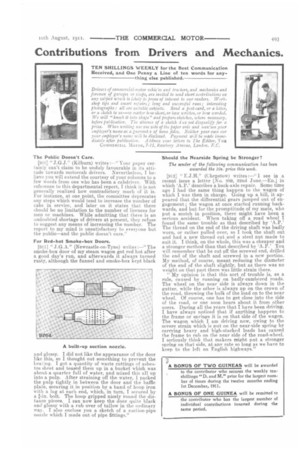Contributions from Drivers and Mechanics.
Page 17

If you've noticed an error in this article please click here to report it so we can fix it.
TEN SHILLINGS WEEKLY for the Best Communication Received, and One Penny a Line of ten words for any thing else published.
Drives s of commercial-motor vehic'es and tra:tors, and mechanics and foremen of garages or shops, are invited to send short contributions on any subject winch is likely to prove of interest to user readers, Work. shop tips and smart repairs ; long and successfial runs ; interesting
photographs all are suitable subjects. Send a po.si-card, or a letter, or a sketch to ies—no matter how short, or how orWen, or how worded. We will " knock it into shape" and ps,epare sketches, where necessary, before publication. The absence of a sketch ct.)es not disqualify for a prize, When writing use one side of the paper only and men!ion your employer's name as a guarant.e of bona fides. Neither your own nor your employer's name will be disclosed. Payment will be made imate• diatelv after publicatioli. Address vour letters to The Editor, ME CommEnci.u, Moron, 7-15, Rosebery Avenue, London, E.G.
The Public Doesn't Care.
[910] "J.G.J." (Kilburn) writes Your impel' certainly can't claim to be unduly favourable in its attitude towards motorcab drivers. Nevertheless, I believe you will extend the courtesy of your columns to a few words from one who has been a cabdriver. With reference to this departmental report, I think it is not generally realized how contradictory much of it is. For instance, at. one point, the committee deprecates any steps which would tend to increase the number of cabs in service, and later on it states that there should be no limitation to the number of licences for men or machines. While admitting that there is an undoubted shortage of drivers at present, they refuse to suggest any means of increasing the number. The report to ray mind is unsatisfactory to everyone but the public—and the public doesn't. care."
For Red-hot Smoke-box Doors.
[911] " J.G.A." (Newcastle-on-Tyne) writes :—" The smoke-box door of my steam wagon got red hot after a good day's run, and afterwards it always turned rusty, although the funnel and smoke-box kept black and glossy. I did not like the appearance of the door like this, so I thought out something to prevent the heating. I got a quantity of waste cuttings of asbestos sheet and teased them up in a bucket which was about a quarter full of water, and mixed this all up into a pulp. After straining off the water, I packed the pulp tightly in between the door and the baffle plate, securing it in position by a band of hoop iron with a lug at each end, which, in turn, I secured by a bolt. The hoop gripped nicely round the distance pieces. I can now keep the door quite black and glossy with a rub over of tallow in the ordinary way. I also enclose you a sketch of a suction-pipe nozzle which I made out of pipe fittings."
Should the Nearside Spring be Stronger?
The sender of the following communication has been awarded the Ws. prize this week.
[912] E.J.H." (Chepstow) writes :—" I see in a recent issue a letter [No. 889, 22nd June.—ED.1 in which `A.P.' describes a back-axle repair. Some time ago I had the same thing happen to the wagon of which I was then in charge. Going up a hill, it appeared that the differential gears jumped out of engagement ; the wagon at once started running backwards, and but for the promptitude of my mate, who put a scotch in position, there might have been a serious accident. When taking off a road wheel I found the same trouble as that described by ‘A.P.' The thread on the end of the driving shaft was badly worn, or rather pulled over, so I took the shaft out and had a new thread cut and a steel nut made to suit it. I think, on the whole, this was a cheaper and a stronger method than that described by A.P.' You will remember that he cut off the screwed end, drilled the end of the shaft and screwed in a new portion. My method, of course, meant reducing the diameter of the end of the shaft slightly, but as there was no weight on that part there was little strain there. " My opinion is that this sort of trouble is, as a rule, caused by running on badly-cambered roads. The wheel on the near side is always down in the gutter, while the other is always up on the crown of the road, throwing the bulk of the load on to the near wheel. Of course, one has to get close into the side of the road, or one soon hears about it from other users. During all the years that I have been driving, I have always noticed that if anything happens to the frame or springs it is on that side of the wagon. The wagon which I am driving now, owing to the severe strain which is put on the near-side spring by carrying heavy and high-stacked loads has caused the frame to rub on the near side of the road-wheel. I seriously think that makers might put a stronger spring on that side, at any rate so long as we have to keep to the left on English highways."


















